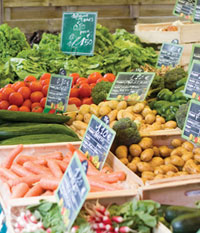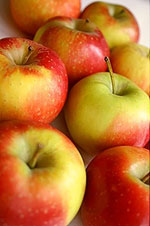 Last week at this time I was flying through the sky in a fuel-guzzling plane. I was on my way to New Orleans to attend the the 30th annual conference of the International Association of Culinary Professionals (IACP).
Last week at this time I was flying through the sky in a fuel-guzzling plane. I was on my way to New Orleans to attend the the 30th annual conference of the International Association of Culinary Professionals (IACP).
One of the sessions I attended at the conference was about Environmental Responsibility in Cookbooks, Magazines and Newspaper Food Sections. Kristine Kidd, food editor of Bon Appetit Magazine, Russ Parsons, food columnist of the Los Angeles Times, and Suzanne Rafer, Executive Editor and Director of Cookbook Publishing at Workman Publishing each shared their expertise, experiences and opinions regarding the place of environmentally responsible food in our lives.
Sustainable. Local. Organic. They've become culinary buzz words. They've caused confusion. What does it all mean? Russ Parsons says there is not even a definition for sustainability. He also cautions that organic is not necessarily synonymous with small farming. He suggests visiting a conventional farm to see what they're doing.
Basically, all the buzz boils down to just eating good food. Good food is the stuff you'll find around the outside perimeter of your supermarket -- fresh fruits and vegetables, whole grain breads, fish, meat, milk, butter. It's the great food we find at the farmers' market, grown on small farms by people who care about protecting the earth and protecting the health of humans who will eat the food they grow.
 That's a good step in the right direction. The next step might be to try some organic fruits and vegetables. Apples, greens and strawberries are good choices when you start buying organic. Organic fruits and vegetables cost more than conventionally-grown produce. Kristine Kidd of Bon Appetit says she buys only organic chicken. Because the cost is so high, she eats chicken less often. And she uses every bit of that organic chicken.
That's a good step in the right direction. The next step might be to try some organic fruits and vegetables. Apples, greens and strawberries are good choices when you start buying organic. Organic fruits and vegetables cost more than conventionally-grown produce. Kristine Kidd of Bon Appetit says she buys only organic chicken. Because the cost is so high, she eats chicken less often. And she uses every bit of that organic chicken.
Sustainable, local, organic. It's about wonderful flavor. It's about health. And, it's about being responsible when making choices that will affect you, your family and the earth.
I don't want to scare anyone away from bad food. I just want to educate and gently guide you to good food. It just takes one little something, one little change. You can read my Earth Day newspaper column by clicking here.
Michael Pollan, author of The Omnivores Dilemma, wrote an essay for the New York Times in January of 2007. "Unhappy Meals" is a little long, but it's an easy read and is very interesting. Try to at least read the last two pages of the essay. Pollan offers nine simple suggestions to help point us in the direction of good health, great flavor and an earth that can allow us to enjoy those two things.
Oh, you're probably wondering about the bags in the picture. It's the one little something I did on Earth Day. I gathered all the paper bags I've been collecting in a cupboard in my laundry room and took them over to the natural foods co-op in town where they will be used again.
And, I remembered to take my cloth grocery totes into the store with me to use for packing up my purchases.
It's all those little somethings that are better than nothing -- everyday.
Sue Doeden is a popular cooking instructor, food writer and integrative nutrition health coach. She is the host of Good Food, Good Life 365 on Lakeland Public Television. Her own hives full of hardworking bees and her love of honey led to the creation of her recently published cookbook, Homemade with Honey.
